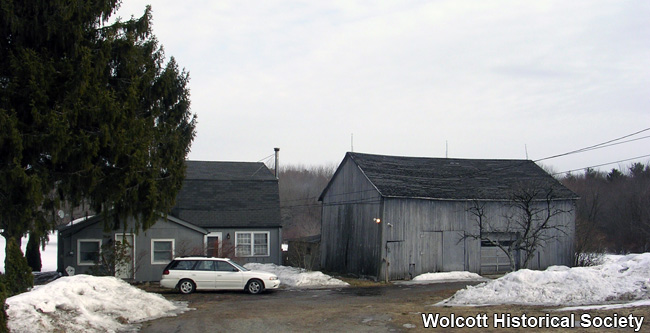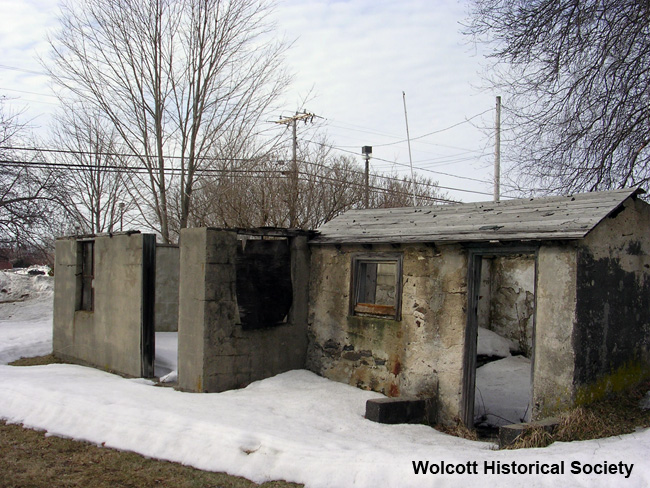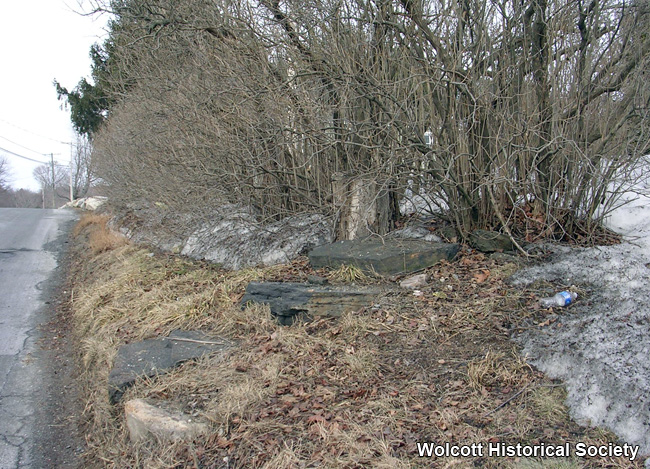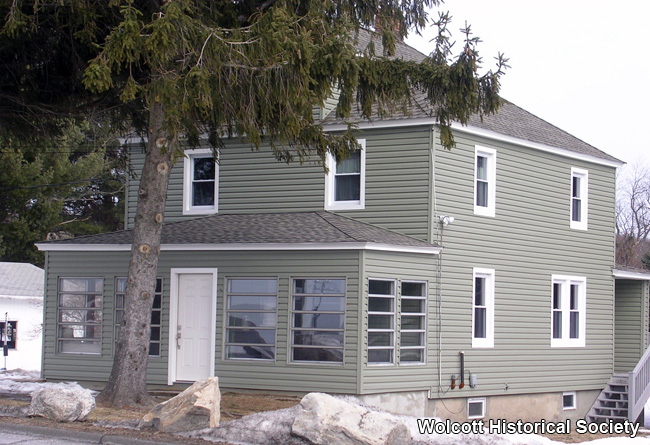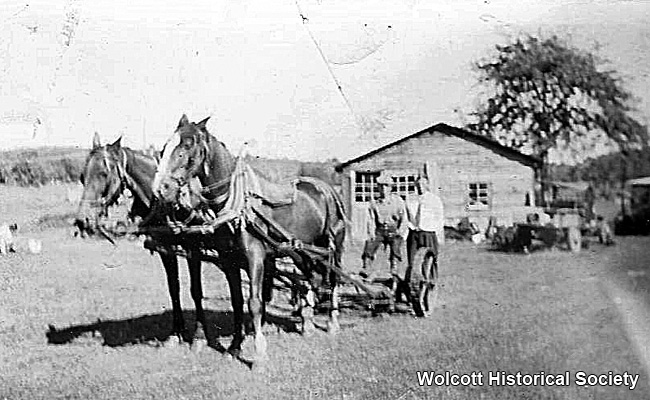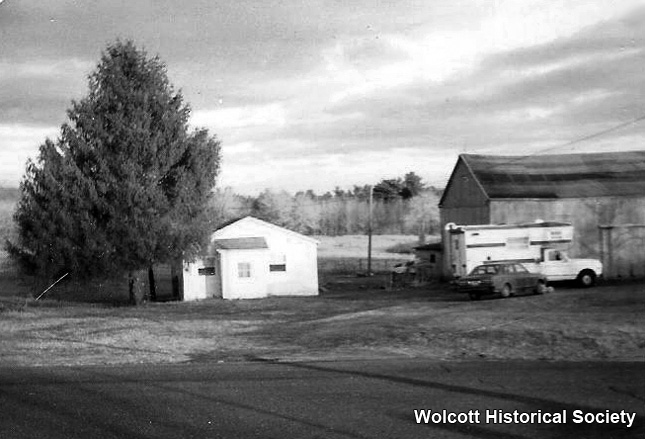|
|
||||||||||||
 |
 |
|
Wolcott Historical Society News - March 2011 By Florence Goodman In this edition I will discuss a farm that was located in the Wolcott Center District of town across from Wolcott High School, but before I begin this discussion, I would like to make a correction to last month's article. I had stated that, "John Lewandoski's oldest son, Walter, took over the house north of the tavern on Wolcott Road and is still living there." Correction, Walter is his youngest son, not his oldest son. Now onto this month's farm.
As stated in a previous article, the Wolcott District covered a very large area in the center of town, but it also included land extending over to the eastern border of Wolcott. Some early families found in this district were Pritchard, Minor, Hotchkiss, Carter, Somers, Sperry, Warner, Hough, Moulthrop, Finch, Porter, Butler, Bailey, Hall, Upson, and Ferry. Many of these old farms were sold or abandoned in the late 1800s as people moved to the cities to work in the factories, but this changed during the 1930s and 1940s. The Depression forced people to move back into rural areas where they could grow their own food and the cost of living was cheaper; thus the increase in so many sustenance farms in our town.
The Passuck (Passick) Farm was located on Bound Line Road across from where Wolcott High School is found today. On the 1868 map, the property was owned by J.N. Sperry who sold the land to a Mr. Cameron in the early 1900s. Elizabeth and Jacob Passuck, Russian immigrants living in the north end of Waterbury heard about this property that contained bountiful blueberry bushes; they purchased it from Mr. Cameron in the early 1920s.
This 60+-acre parcel of land bordered Bound Line and Catering Roads. When the Passuck's bought the property it consisted of a house, a small bungalow and a large barn. Alongside the barn was a large hand dug well and behind the barn was another area to house the cows. For several years the farm workers who cleared and tilled the land, and tended to the cows lived in the bungalow while Elizabeth and Jacob lived in the house. The Passuck's also rented out small plots of farmland to immigrants from the north end of Waterbury which gave them extra money in these hard times. These farmers mainly grew root vegetables like potatoes, parsnips, beets, and also cabbage; these were crops that carried the families through the winter because they stored well.
Elizabeth loved to pick the blueberries that covered much of the property. In the back end of the farm there were swampy areas that had high blueberry bushes. Elizabeth would go out wearing her babushka, hip boots and apron to pick berries. She would fill her apron with the berries then dump them into large galvanized buckets. She usually picked four buckets of berries each time she went out picking. She would then clean the berries and sell them to the bakeries in Waterbury. Elizabeth was not only hard working, but also very ingenious when it came to finding ways to help with the bills.
About two years after they moved to the farm, the house burned down and the family had to move into the bungalow, which was behind the original house. The old steps from the original house still remain next to the road by the lower driveway. Sometime later, the Passuck's built two new buildings next to the lower driveway; one was a milk house and attached to that was a stable for the horses and the carriage that carried the milk.
Jacob and Elizabeth had two daughters who also helped out on the farm; they were Sasha, which translated into Alexandra, but was shortened to Alice, and Nadya. The girls worked the farm with their family and helped their mother deliver the milk in Waterbury. The milk was stored in large milk cans that were placed in a carriage and driven around the Waterbury neighborhoods then ladled into containers that the families gave them.
In the late 1930s Elizabeth started working at Scovills Manufacturing Company. Each day she would walk to and from work no matter what the weather. They still had the farm, but mainly for sustenance; Elizabeth loved that farm and worked the land until the day she died.
In 1934/35 their daughter, Alice, married Joseph Douglas and they built a house on the property, which is still standing today, but it was recently sold. Their second daughter, Nadya married Frances Bruce sometime later. They built a house on the south side of the property. In the late 1990s the family sold about fourteen acres of land for the building of several homes on Old Farm Road. Most of the land remains in the family today and several family members still live on the property. Mike and Linda Bruce and their family remain on the land and Mike's sister-in-law, Mary Bruce, still lives in the bungalow house on the original farm.
Across Bound Line Road from the Passuck Farm was the Pritchard property which today is where Wolcott High School is located. In 1870 Pritchard owned all the land where the High School is located on the west side of Bound Line Road to the cemetery and down to Minor Road all the way beyond Center Street to where Wolcott Road is located today. Pritchard had planted a large apple orchard on his property, hence Orchard Lane.
Between Orchard Lane and the driveway to Wolcott High was a small house that the town recently purchased. The Mitchowski family, shortened to Mitchell lived there. They had the orchard, grew sustenance crops in the family garden and had cows grazing on their land. Every once in awhile the police would raid the Mitchowski Farm thinking they were selling distilled spirits made from the apple mash, but it was not them, it was the Passuck family making these illegal spirits. When the police would arrive, the workers at the Passuck Farm would hide the spirits in the old well next to the barn and then cover-up the well; thus they were never caught. When the Passuck women would deliver milk to Waterbury, they too would sell bottles of illegal "distilled spirits." They would hide the bottles in the milk cans and sell it along with the milk.
This concludes my articles about "Old Farms of Wolcott", unless I hear from readers about some that I have missed. I am still trying to find out any information about the "Golden Crest Dairy" that was located on Tosun Road in Wolcott. I know that Willow Brook Dairy was located on Tosun Road also and wonder if they may have been connected at some point in time. Golden Crest Dairy was still in existence in the early 1960s because I found it listed in the Wolcott Phone Directory for 1964-65. If you have any information about this Dairy, I would appreciate hearing from you.
(Information for this article was taken from a February 2011 interview with Mike Bruce, who was the grandson of Elizabeth and Jacob Passuck, a phone conversation with Mary Bruce, Samuel Orcutt's History of the Town of Wolcott From 1731 to 1874, and from The 1986 Historic Resources Inventory by J.P. Loether.)
Our Schoolhouse Museum is open by appointment only; you may visit the Museum by calling Loretta Leonard at 203-879-4310 or Flo Goodman at 203-879-9818. Our meetings are held on the first Thursday of each month at the Old Stone School on Nichols Road at 6:30 P.M. unless snow cancels them in the winter season.
The original bungalow house and barn on the Passuck Farm.
The old milk house and the attached stable for the horses and storage of the carriage for carrying the milk cans.
Steps leading to original house on Passuck Farm.
The Douglas House built circa 1934/35.
Passuck (Passick) Farm, 1930s.
Passuck Farm
To view past installments of the Wolcott Historical Society News, click here.
|
|
|
[Home]
[News]
[Purpose]
[Calendar]
[Museum]
[Membership]
[History]
[Contacts]
[Links]
All material at Wolcott Historical Society Web sites Copyright © 2000-2011 Wolcott Historical Society |
